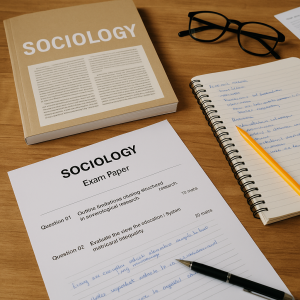Preparing for A Level Sociology exams can be overwhelming. With a mix of theories, research methods, and case studies, students often struggle to know where to focus their revision. One of the most effective tools to master exam preparation is A Level Sociology past papers. These resources provide a window into the exam’s structure, the types of questions asked, and the level of detail required to score high marks.
In this ultimate guide, we’ll explain why A Level Sociology past papers are essential, how to use them effectively, and strategies for maximizing your performance.
Why A Level Sociology Past Papers Are Essential
A Level Sociology past papers are previous exam papers released by exam boards such as AQA, OCR, and Edexcel. They serve multiple purposes:
-
Familiarity with Exam Format: Each exam board has its own question style, structure, and marking scheme. Past papers allow students to understand what to expect.
-
Insight into Common Question Patterns: Over the years, certain question types, such as “evaluate,” “discuss,” or “compare,” appear frequently. Recognizing these patterns helps students anticipate what may come up.
-
Application of Knowledge: Sociology exams are not just about memorizing theories. They test your ability to apply concepts to real-world scenarios. Past papers give students practice in linking theory with evidence.
-
Time Management Practice: Past papers provide an opportunity to simulate exam conditions, helping students allocate time wisely for each section.
-
Self-Assessment: Working through past papers highlights strengths and weaknesses, allowing targeted revision.
In short, past papers are not just revision tools they are strategic instruments to improve exam readiness.
How A Level Sociology Past Papers Help Improve Exam Performance
Practicing with A Level Sociology past papers offers multiple benefits that directly influence exam success.
1. Understanding Question Types
Sociology exams often feature a variety of questions, including short-answer, data-response, and essay-based questions. Each type demands different skills:
-
Short-answer questions require concise definitions or examples.
-
Data-response questions test your ability to analyze graphs, tables, or statistics in a sociological context.
-
Essay questions require evaluation, critical thinking, and integration of multiple sociological perspectives.
By reviewing past papers, students become familiar with these question types and learn the level of detail required for each.
2. Practicing Theory Application
One common mistake students make is memorizing theories without learning how to apply them. Sociology exams often ask questions such as:
“Evaluate the role of education in perpetuating social inequality.”
Answering this requires:
-
Recalling relevant theories, such as Functionalism, Marxism, or Feminism
-
Applying studies or examples to support points
-
Evaluating the strengths and limitations of each perspective
Past papers provide real examples of such questions, allowing students to practice linking theory to evidence and honing their analytical skills.
3. Improving Essay Structure
Essay questions make up a significant portion of A Level Sociology exams. A well-structured essay is key to scoring high marks. Past papers help students practice:
-
Writing clear introductions that outline arguments
-
Structuring paragraphs around sociological theories, evidence, and evaluation
-
Concluding essays effectively with a summary and critical insight
Repeated practice develops not only essay-writing skills but also the ability to communicate complex ideas clearly and concisely.
4. Building Time Management Skills
Many students struggle with completing the paper within the allotted time. Past paper practice allows you to:
-
Estimate the time needed for each question
-
Avoid spending too long on questions that carry fewer marks
-
Allocate time for reviewing answers and checking analysis
By simulating exam conditions, students learn how to pace themselves and maintain accuracy under pressure.
5. Identifying Knowledge Gaps
Past papers are excellent diagnostic tools. When a student struggles with certain questions—like research methods or family sociology it signals a need for targeted revision.
Keeping an error log is an effective strategy:
-
Record questions answered incorrectly
-
Note the topic or theory involved
-
Analyze why the mistake occurred
-
Review the correct approach
This process ensures students can focus their efforts efficiently, addressing weak areas before exam day.
Strategies for Effective Past Paper Practice
To maximize the benefits of A Level Sociology past papers, students should adopt strategic approaches:
1. Start with Untimed Practice
Begin by attempting past papers without a time limit. Focus on understanding the question types, recalling relevant theories, and practicing analysis. This stage is about mastering content, not speed.
2. Use Mark Schemes Wisely
Reviewing the examiner’s mark scheme helps students understand:
-
How marks are awarded
-
The expected level of detail
-
What distinguishes high-scoring answers
Compare your answers to the mark scheme to identify strengths and areas for improvement.
3. Simulate Exam Conditions
Once confident, attempt past papers under timed conditions. This builds exam stamina, improves time management, and reduces anxiety on the actual exam day.
4. Mix Papers from Different Exam Boards
Practicing papers from different boards exposes students to a variety of question styles and phrasing. This improves adaptability and prepares students for unexpected scenarios.
5. Track Progress
Keep a record of scores and note improvements over time. Tracking progress helps motivate students and ensures revision is focused and productive.
Using Past Papers Alongside Other Revision Techniques
While past papers are essential, they work best in combination with other revision strategies:
-
Summary Notes: Condense each topic into key points for quick review.
-
Flashcards: Use them for key concepts, theorists, and studies.
-
Group Discussions: Discussing theories with peers can reinforce understanding and introduce new perspectives.
-
Online Resources: Videos, articles, and revision websites can provide alternative explanations for complex topics.
Integrating these techniques with past paper practice creates a comprehensive, effective study plan.
Conclusion
A Level Sociology past papers are more than just practice tools they are the cornerstone of effective revision. They familiarize students with exam structure, improve essay-writing skills, enhance knowledge application, and build exam confidence.
By using past papers strategically, tracking progress, and combining them with other revision techniques, students can maximize their exam performance and reduce anxiety.
For any A Level Sociology student aiming for high grades, past papers are not optional—they are essential. Start practicing early, remain consistent, and watch your confidence and performance soar.







